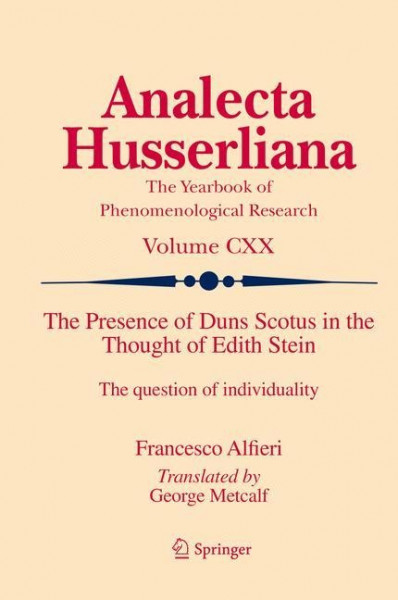
The Presence of Duns Scotus in the Thought of Edith Stein
Kurzinformation
inkl. MwSt. Versandinformationen
Artikel zZt. nicht lieferbar
Artikel zZt. nicht lieferbar

Beschreibung
This book examines the phenomenological anthropology of Edith Stein. It specifically focuses on the question which Stein addressed in her work Finite and Eternal Being: What is the foundational principle that makes the individual unique and unrepeatable within the human species? Traditional analyses of Edith Stein's writings have tended to frame her views on this issue as being influenced by Aristotle and Thomas Aquinas, while neglecting her interest in the lesser-known figure of Duns Scotus. Yet, as this book shows, with regard to the question of individuality, Stein was critical of Aquinas' approach, finding that of Duns Scotus to be more convincing. In order to get to the heart of Stein's readings of Duns Scotus, this book looks at her published writings and her personal correspondence, in addition to conducting a meticulous analysis of the original codexes on which her sources were based. Written with diligence and flair, the book critically evaluates the authenticity of Stein's sources and shows how the position of Scotus himself evolved. It highlights the originality of Stein's contribution, which was to rediscover the relevance of Mediaeval scholastic thought and reinterpret it in the language of the Phenomenological school founded by Edmund Husserl. von Alfieri, Francesco
Produktdetails

So garantieren wir Dir zu jeder Zeit Premiumqualität.
Über den Autor
Francesco Alfieri is professor of philosophy at the Pontificia Universitas Lateranensis, which appointed him International Area Research Secretary for "Edith Stein in contemporary philosophy". He is the Editor-in-chief for the annotated Italian edition of the complete works of H. Conrad-Martius and the series entitled "Philosophy - Phenomenology - Texts by Anna-Teresa Tymieniecka", published by Morcelliana.

- Kartoniert
- 192 Seiten
- Erschienen 2005
- C.H.Beck

- Kartoniert
- 143 Seiten
- Erschienen 2021
- Evangelische Verlagsanstalt

- paperback
- 211 Seiten
- Junius Verlag

- paperback
- 296 Seiten
- Erschienen 1975
- Routledge

- Kartoniert
- 202 Seiten
- Erschienen 2001
- Suhrkamp Verlag

- paperback
- 424 Seiten
- Erschienen 2000
- Herder Editorial

- hardcover
- 392 Seiten
- Erschienen 2013
- Verlag Herder

- Kartoniert
- 204 Seiten
- Erschienen 1994
- Parerga





 bestellen
bestellen






























